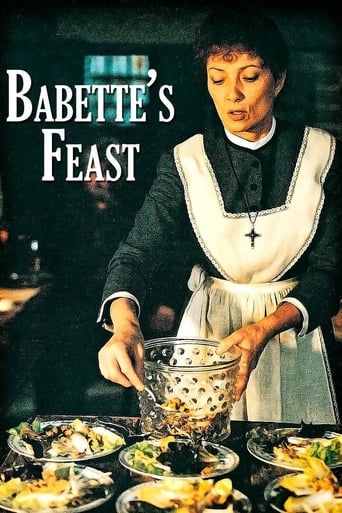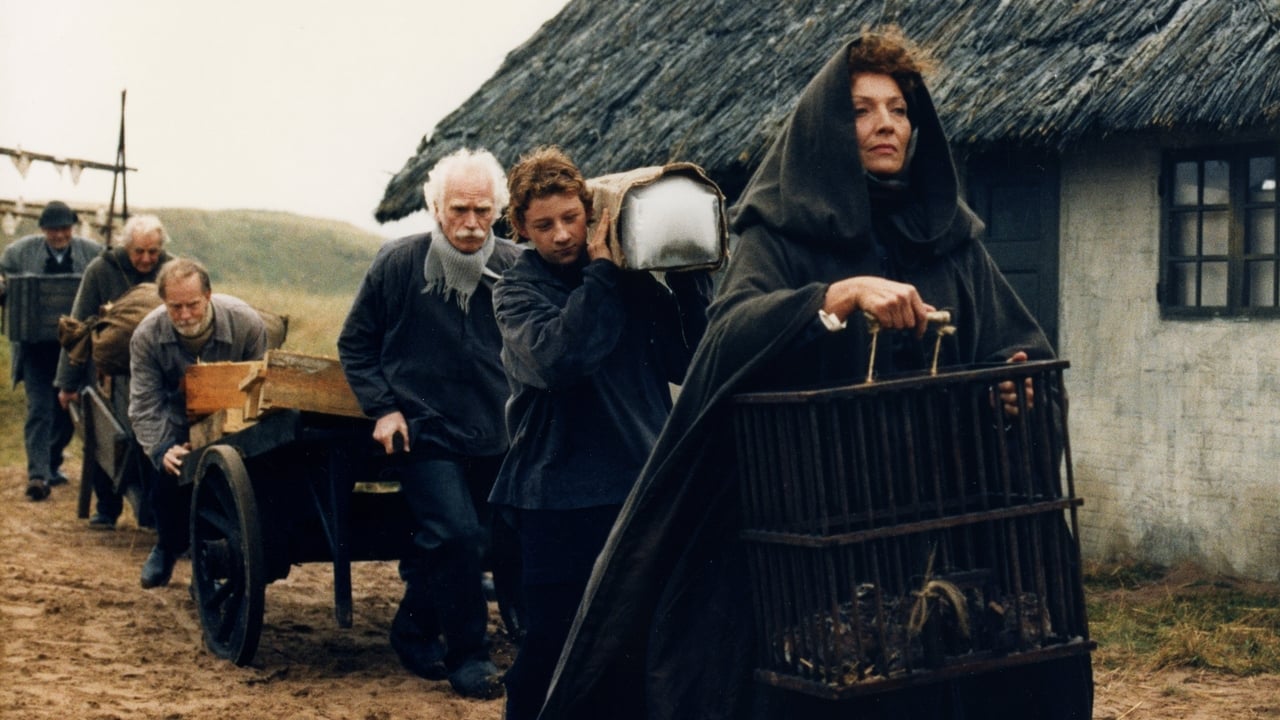grantss
Denmark, 1870s. Two deeply religious elderly sisters living in an isolated village take in a French refugee from the Franco-Prussian war, Babette. She becomes their housekeeper and is happy to work for no pay. 14 years later, Babette wins a large amount of money in a lottery. The event coincides with the 100th anniversary of the birth of the sisters' father, a devout Christian minister who had a great following in the village. Babette decides to throw a great dinner for the the remaining followers to honour the occasion. One thing: the dinner will be French and once the ingredients start to arrive, the unsophisticated villagers suspect that something unholy is about to take place.Based on a short story by Karen Blixen (of Out Of Africa fame), this is an engaging, though not overly profound, movie. Starts slowly, showing the sisters' back story and building to the present day. The back story seems unnecessary initially, especially as it seems to wander and add nothing to the overall plot. However, the past, especially the characters therein, will have an important impact on the present.The movie hits its stride in the second half, especially once Babette wins the lottery. A few themes start to emerge and the story becomes more engaging. An important shift takes place, in that the focus moves from the sisters to Babette, and this makes things much more interesting.Unfortunately, the themes that emerge don't lead to anything too profound. I had visions of a powerful examination of how people's prejudices prevent them from enjoying life's simple pleasures, or how great art/food is lost on simple folk, but nothing really came of those.Ultimately, an interesting story, lacking a powerful conclusion. Will make you very hungry though - the food looks fantastic!Won the Oscar for Best Foreign Language Film in 1988.
sharky_55
A grandmother, I presume, narrates Babette's Feast with a fairytale-like presence and charm. It is old fashioned like that, based on the short story from Karen Blixen, and the two central sisters reflect this. Flashbacks establish their devout nature and piousness. Martine is courted by a young soldier, handsome and ambitious, who later becomes an important figure in the Queen's court. Philippa by a marvellously talented singer whom has become depressed by the constant travel and only wants to settle down. The scenes of their duet and how they engage in love songs are terribly romantic, except for Philippa's expression, clearly uncomfortable by even the mere lyrics and implied sinful notions they carry (although there is a suggestion that this might be significantly from her puritan perspective - otherwise how would Papin be so sure of sending them Babette?). They live up to their Protestant figurehead namesakes that their dear father/pastor must have lovingly bestowed them; Martin Luther King and Philipp Melanchthon. So even as they are beautiful as flowering fruit trees, as they are described, they refrain from falling in love, and plead their allegiance to their father's church. When Babette, a survivor of the Paris Commune, arrives, the church community thanks and praises God for sending them this gift so that the sisters may continue to spread the good work and tend to the flock. And like so many communities there is invariably discord - accusations of affairs, people cheating other's of their money, lies and dissatisfaction. They are not oblivious to this, but they push it out of their minds for more important, high-minded issues. When Babette declares she is making a French dinner with the works, they hesitantly approve, and then are tentative on the serving of wine. It is a gateway to sin, and Axel emphasises this with a green-tinged nightmare filled with grotesque, satanic imagery fit for Revelations; fiery visions of hell, animals rearing their ugly heads, and the spill of red wine like blood. The feast is the lengthiest segment of the film, and the best. Henning Kristiansen initially establishes the rural, puritan village with a desaturated palette devoid of any idyllic environmental imagery or tempting vices. This reinforces their way of life - bare and plain, like the food that Babette serves the sisters with whatever meagre groceries that she can haggle for. And then he introduces candlelight and lamp, briefly warm in their glow, to accompany the feast. But he does not ramp this up to food porn levels - the ingredients are not exotic splashes of colour to bring life into the lives of the village - that change must come from within. The only out of place shot is the one immediately after the cathartic meal, the almost storybook scene of the endlessly beautiful starry night that looks upon their dance and song. This seems deliberately so, as if to over-highlight a new outlook on life. What many have not touched on is how funny Babette's Feast can be. The villagers all agree to shut out out temptations and refuse to comment on the food, no matter how good it is. The only one that is from a different perspective is Lorens, who has the expertise and freedom to do so. And he does too, marvelling at each course and dish and lavishing the flavours and combinations. The humour comes from the other dinner guests, who most evidently feel the same way about the food as he does, but do not want to admit it. Instead they chime awkwardly in with religious recitations that fall on deaf ears and gross, offended looks at the sinful gluttony that is occurring right beside them. The food continues to be served (in a way that is reminiscent of Big Night, and how the courses overwhelm the guests) and there is a slow epiphany. Old feuds are forgiven and forgotten, lost love is rekindled. The film is not anti-religious in any way, but serves up a tale that is able to rouse even the most pious to slurp and suck every last drop and swallow every last bite with relish. Babette may have nothing left, but ironically it is her that has gained and dished out the spiritual fulfilment, and they are all full, and so is the audience.
SnoopyStyle
It's 19th century Denmark. Aged sisters Martine and Philippa live austere lives in a remote settlement founded by their father. He is long dead and the disciples are dwindling. The sisters have a french maid named Babette. The movie flashes back to the sisters as beautiful young women. The village is more vibrant. Officer Lorens Löwenhielm is sent to the remote coast and courts Martine. Opera star Achille Papin from Paris courts Philippa. Their father opposes both. They end up spending their lives taking care of their father. Later, the sisters take in French refugee Babette Hersant. Later still, Babette wins the lottery and asks to cook a delicious French meal for everybody in the village. The sisters relents and then fears the worst for their souls.The strict pious manner really takes the life out of the material for me. It loses the passion and the excitement of the love stories. The narration puts another layer of separation between me and the immediacy of the romances. It becomes something of a stilted story. There is nothing much for the first half. Then it becomes magnificent food porn. It is funny and a joy. I just wish I didn't have to wait so long for it. The first half is no more than 3. The second half is a solid 7.
Chevy Battaglia
As someone who has read the short story by Isak Dineson along with the movie, I agree with many others that this movie is not simply a "foodie flick," but offers a psychological and religious depth perspective on the life of a woman who's lost everything near and dear to her and how she manages to rise above her grievous losses. The book portrays Babette as a dark, formidable presence in the lives of Martina and Philippa. Axel downplays this aspect, but does maintain it in subtle ways. Axel does go beyond Dineson's portrayal by suggesting Babette is a kind of Christ figure. For more on these themes, a simple online search for critical articles about the movie yields many fine writings (see esp. the Journal of Religion and Film and the Carl Jung page).


 AD
AD








